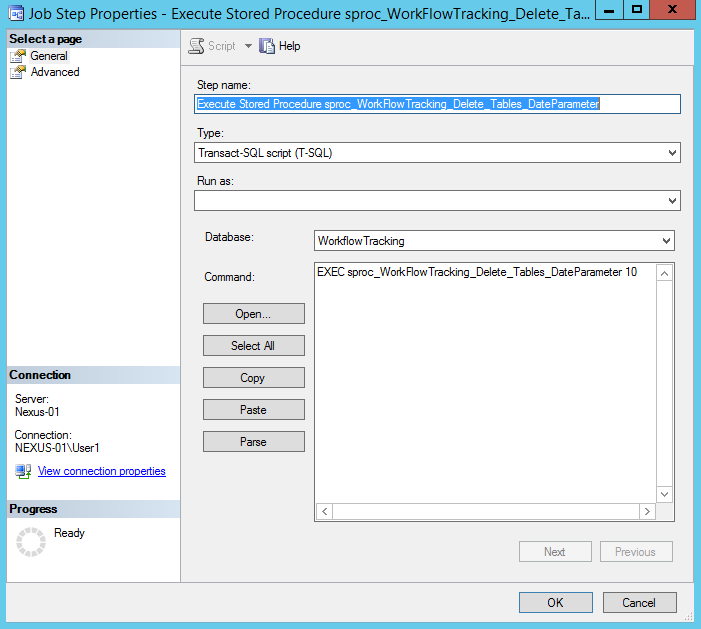Workflow Tracking DB Cleanup Script
If you are using the Workflow Tracking database, you may find that it grows at a rapid pace depending on the configured tracking level.
The attached script can be run against the tracking database to clean out records on a regular basis. The steps below describe the parameter that needs to be entered and what is needed to schedule it as an SQL job.
-
Use the script sproc_WorkFlowTracking_Delete_Tables_DateParameter.sql. Download or copy it below.
The script only requires a date parameter to be populated. In the scenario below, anything older than 10 days would be deleted.
IF EXISTS (SELECT * FROM INFORMATION_SCHEMA.ROUTINES r WHERE r.routine_name='sproc_WorkFlowTracking_Delete_Tables_DateParameter' and r.routine_schema='dbo') DROP PROCEDURE dbo.sproc_WorkFlowTracking_Delete_Tables_DateParameter GO /****** Object: StoredProcedure [dbo].[sproc_WorkFlowTracking_Delete_Tables_DateParameter] Script Date: 10/9/2015 10:42:47 AM ******/ SET ANSI_NULLS ON GO SET QUOTED_IDENTIFIER ON GO CREATE PROCEDURE [dbo].[sproc_WorkFlowTracking_Delete_Tables_DateParameter] -- Add the parameters for the stored procedure here @NumberOfDays int AS BEGIN /* Exec [dbo].[sproc_WorkFlowTracking_Delete_Tables_DateParameter] 10 */ -- SET NOCOUNT ON added to prevent extra result sets from -- interfering with SELECT statements. SET NOCOUNT ON; DECLARE @HowManyRecordsTobeDeleted INT; DECLARE @InitialSet INT; Set @InitialSet = 500; SET @HowManyRecordsTobeDeleted = @InitialSet; WHILE @HowManyRecordsTobeDeleted > 10 BEGIN BEGIN TRY BEGIN TRAN delete top (@HowManyRecordsTobeDeleted) [workflowtracking].[System.Workflow.Tracking].[WorkflowInstanceEventsTable] from [workflowtracking].[System.Workflow.Tracking].[WorkflowInstanceEventsTable] where (DATEDIFF(day,[workflowtracking].[System.Workflow.Tracking].[WorkflowInstanceEventsTable].TimeCreated,Getdate())>=@NumberOfDays) SET @HowManyRecordsTobeDeleted = @@ROWCOUNT print 'deleted WorkflowInstanceEventsTable' COMMIT TRAN END TRY BEGIN CATCH ROLLBACK TRAN set @HowManyRecordsTobeDeleted = 0 print 'ERROR in deleting WorkflowInstanceEventsTable' END CATCH END set @HowManyRecordsTobeDeleted = @InitialSet WHILE @HowManyRecordsTobeDeleted > 0 BEGIN BEGIN TRY BEGIN TRAN delete top (@HowManyRecordsTobeDeleted) [workflowtracking].[System.Workflow.Tracking].[ActivityInstanceEventsTable] from [workflowtracking].[System.Workflow.Tracking].[ActivityInstanceEventsTable] st where (DATEDIFF(day,st.TimeCreated,Getdate())>=@NumberOfDays) SET @HowManyRecordsTobeDeleted = @@ROWCOUNT print 'deleted ActivityInstanceEventsTable' COMMIT TRAN END TRY BEGIN CATCH ROLLBACK TRAN set @HowManyRecordsTobeDeleted = 0 print 'ERROR in deleting ActivityInstanceEventsTable' END CATCH END set @HowManyRecordsTobeDeleted = @InitialSet WHILE @HowManyRecordsTobeDeleted > 0 BEGIN BEGIN TRY BEGIN TRAN delete top (@HowManyRecordsTobeDeleted) [workflowtracking].[System.Workflow.Tracking].[ExtendedActivityEventsTable] from [workflowtracking].[System.Workflow.Tracking].[ExtendedActivityEventsTable] stc where (DATEDIFF(day,stc.TimeCreated,Getdate())>=@NumberOfDays) SET @HowManyRecordsTobeDeleted = @@ROWCOUNT print 'deleted ExtendedActivityEventsTable' COMMIT TRAN END TRY BEGIN CATCH ROLLBACK TRAN set @HowManyRecordsTobeDeleted = 0 print 'ERROR in deleting ExtendedActivityEventsTable' END CATCH END set @HowManyRecordsTobeDeleted = @InitialSet WHILE @HowManyRecordsTobeDeleted > 0 BEGIN BEGIN TRY BEGIN TRAN delete top (@HowManyRecordsTobeDeleted) [workflowtracking].[System.Workflow.Tracking].[BookmarkResumptionEventsTable] from [workflowtracking].[System.Workflow.Tracking].[BookmarkResumptionEventsTable] stc where (DATEDIFF(day,stc.TimeCreated,Getdate())>=@NumberOfDays) SET @HowManyRecordsTobeDeleted = @@ROWCOUNT print 'deleted BookmarkResumptionEventsTable' COMMIT TRAN END TRY BEGIN CATCH ROLLBACK TRAN set @HowManyRecordsTobeDeleted = 0 print 'ERROR in deleting BookmarkResumptionEventsTable' END CATCH END set @HowManyRecordsTobeDeleted = @InitialSet WHILE @HowManyRecordsTobeDeleted > 0 BEGIN BEGIN TRY BEGIN TRAN delete top (@HowManyRecordsTobeDeleted) [workflowtracking].[System.Workflow.Tracking].[CustomTrackingEventsTable] from [workflowtracking].[System.Workflow.Tracking].[CustomTrackingEventsTable] stc where (DATEDIFF(day,stc.TimeCreated,Getdate())>=@NumberOfDays) SET @HowManyRecordsTobeDeleted = @@ROWCOUNT print 'deleted CustomTrackingEventsTable' COMMIT TRAN END TRY BEGIN CATCH ROLLBACK TRAN set @HowManyRecordsTobeDeleted = 0 print 'ERROR in deleting CustomTrackingEventsTable' END CATCH END END GO -
The script can also be scheduled as an SQL job to run based on a schedule.

-
You can control the amount of data being tracked by using trackingProfiles (defined within the Service Module Host config file).
Notes:If tracking is configured to track variables, this database can grow extremely fast.
If you do not want tracking enabled, you can remove the tracking profile from the config file.
If you simply want to track the start and stop of a workflow, we recommend the following setting:
<system.serviceModel> <tracking> <profiles> <trackingProfile name="DefaultTrackingProfile"> <workflow activityDefinitionId="*"> <workflowInstanceQueries> <workflowInstanceQuery> <states> <state name="Started" /> <state name="Completed" /> </states> </workflowInstanceQuery> </workflowInstanceQueries> </workflow> </trackingProfile> </profiles> </tracking> </system.serviceModel>